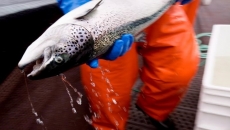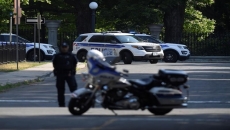Health Canada says it won't require new clinical trial data from vaccine makers on booster shots being developed to target new variants of COVID-19.
Instead, the regulator will rely more heavily on lab tests on blood samples, which can show how many antibodies develop following vaccination. Those antibodies are a good indicator of how well the human body will fight off an infection.
The decision should help the regulator authorize the boosters for use in Canada much quicker and is in line with the process used to approve new flu vaccines each year.
At least three variants of the virus that causes COVID-19 are circulating in Canada and are believed to spread more easily and possibly cause more serious illness. Having vaccines adjusted to target those new strains is a critical part of managing the COVID-19 pandemic.
But Health Canada's chief medical adviser, Dr. Supriya Sharma, said there won't be corners cut on safety in evaluating new boosters.
"They still need to demonstrate that the vaccine that comes out is still safe, effective and high quality," she said in an interview with The Canadian Press earlier this week.
LIVE: Federal health officials provide update on COVID-19 vaccine distribution https://t.co/07Ac2KOAK6
— Health Canada and PHAC (@GovCanHealth) March 4, 2021
Canada has authorized three vaccines, from Pfizer-BioNTech, Moderna and Oxford-AstraZeneca, and all are working on various boosters against variants.
The documents supporting Thursday's decision note that demanding full clinical trials, as was the case for authorizing the original vaccines, would create a serious delay.
"This may also be problematic from a public health perspective since delay in updating a vaccine, where needed, bears the risk that the virus is evolving even further, potentially making a new vaccine version outdated at the time of approval again," the document says.
Coronaviruses don't mutate as quickly as flu viruses, but do change as they spread among people and the more they spread, the more they change.
"So a virus is not going to mutate as much when it can't replicate," Sharma said.
The existing vaccines have shown reduced effectiveness against the variants of concern, though Sharma cautions the vaccines are still useful even against the variants.
The vaccines Canada has authorized are performing well in countries like the United Kingdom and Israel, where the B.1.1.7 variant is now dominant. That variant is thus far the most common of the three variants of concern in Canada, accounting for more than 90 per cent of about 1,430 variant cases confirmed so far.
Many provinces are now screening all confirmed cases of COVID-19 for the variants of concern, and as many as 10 per cent of all confirmed cases are fully sequenced to look for any mutations to the original virus.
The B.1.351 variant that first arose in South Africa is the most concerning to date in its potential to evade existing vaccines. As of Wednesday, there were 103 confirmed cases of it in Canada.
South Africa stopped using AstraZeneca's vaccine altogether after lab tests suggested it wouldn't be very effective against mild illness for B.1.351, which is dominant in that country.
That decision has contributed to growing concerns that AstraZeneca's vaccine is less desirable but Sharma said the details aren't that simple.
"Now, if you look at severe disease, or more severe cases, it actually looked like it was still quite protective," she said.
"But in a country where that is your dominant circulating stream, and in a country where they had potentially had access to another vaccine shortly, they made the decision that maybe they weren't going to go ahead with that," she said.
If B.1.351 becomes a dominant strain here, and current vaccines don't show effectiveness against it, they'll be pulled, Sharma said.
"We wouldn't leave a vaccine on the market if we think that it wouldn't be effective for the overall population."






